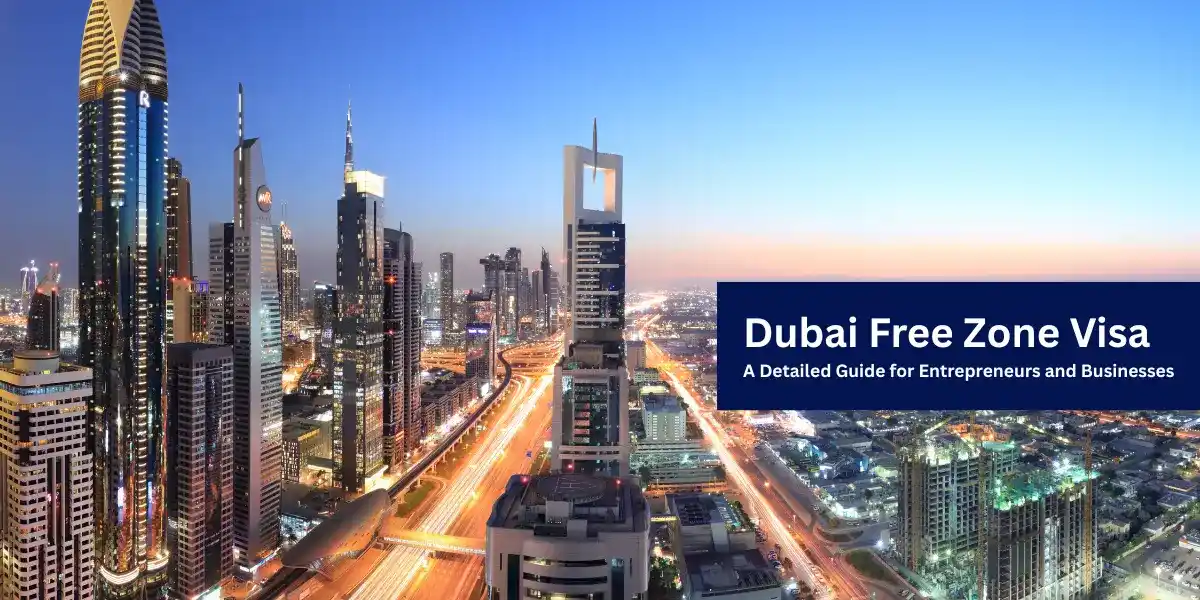Thinking about starting a business in a place full of opportunities? You’ve probably heard about Dubai. Its amazing growth and smart location make it a top spot for people with big ideas from all over the world.
A key reason for this success is the creation of special business areas called free zones. These zones make it very simple for you to start and run your company. To live and work there, you’ll need a special permit, and this guide is all about helping you get your Dubai free zone visa.
So, what can you expect from this guide? We will walk you through every step of getting your visa in 2025.
You will learn about the different kinds of visas available, like for investors or for employees. We’ll also break down the costs involved so you can plan your budget.
Plus, we’ll share tips on how to handle common problems and make the whole process smooth. We’ve gathered all the latest information for 2025 to give you a clear and simple path to setting up your business in this exciting city.
Understanding the Dubai Free Zone Visa: An Overview of All Visa Types
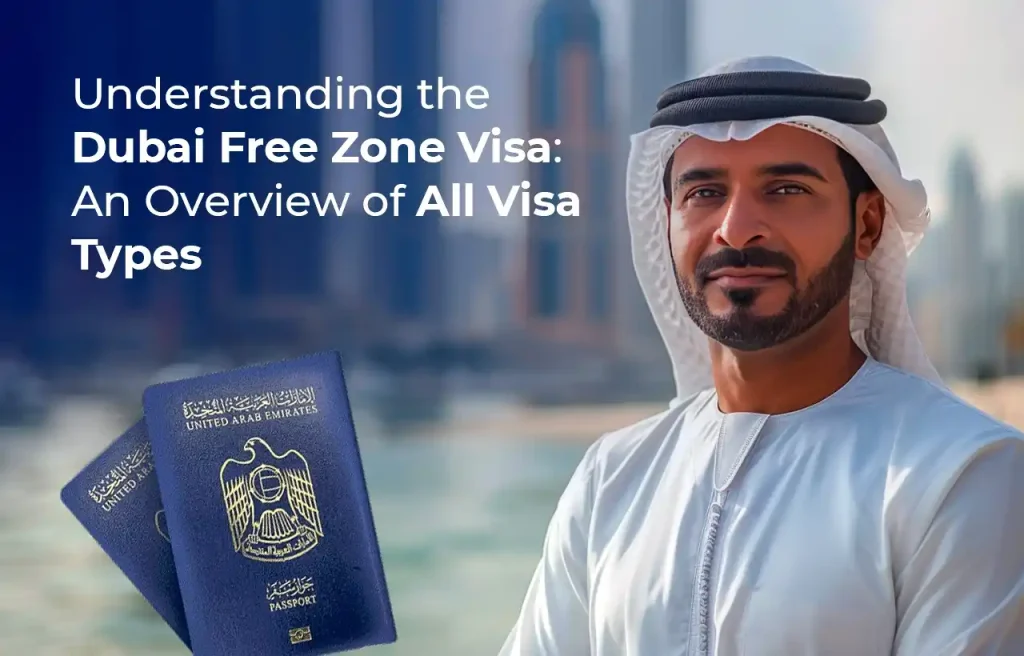
The Investor/Partner Visa (Dubai Investor Visa)
If you are an entrepreneur or a business owner wanting to start your company in Dubai, the Investor Visa is for you. This UAE residence visa is designed for individuals who set up or invest in a business within one of the many free zones.
It acts as your permit to live in the UAE and manage your company. To get this visa, you first need to establish your free zone company visa and obtain a business license from the specific free zone authority where you register.
The standard validity for an investor visa is typically two years, and you can renew it as long as your business remains active. One of the main advantages of this Dubai business visa is that you can sponsor your dependents, such as your spouse and children, allowing your family to live with you in Dubai.
While there isn’t always a strict minimum cash investment for a standard two-year visa, your investment is the cost of setting up and licensing your company. For those looking at longer-term residency, options like the 10-year Golden Visa are available, which do have specific investment requirements, such as a minimum AED 2 million investment.
The Employment Visa (Free Zone Employee Visa)
The Employment Visa is for individuals who have been hired by a company operating within a Dubai free zone. If a free zone company offers you a job, they will act as your sponsor and manage the entire visa application process for you.
This makes it a very direct path to living and working in the city. Your employer is responsible for securing your work permit and residence visa through the relevant free zone authority. The applicant must be between 18 and 60 years old.
As part of the process, you will need to sign a formal employment contract that details your salary, role, and other terms. This contract is a key document for the application. The free zone employee visa is directly linked to your job; its validity usually aligns with your employment contract, which is typically for two years.
If you leave the company, the visa must be officially canceled. This UAE work permit allows you to work only for your sponsoring company within that specific free zone. It provides a secure and legal way for you to be a part of Dubai’s workforce.
The Dependent Visa
If you hold a Dubai residency visa as an investor or employee in a free zone, you can bring your family to live with you. This is done through a dependent visa.
You can sponsor your spouse, children, and even your parents, allowing your family to join you in Dubai. Sponsoring your family is one of the great benefits of setting up your life here.
To sponsor your family, you need to show that you can support them financially. Generally, you must have a minimum monthly salary of AED 4,000, or AED 3,000 plus accommodation provided by your company.
You will also need to prepare several important documents. These include clear copies of your passport and visa, as well as the passport copies of your family members.
For sponsoring a spouse, an attested marriage certificate is required. For children, you’ll need attested birth certificates. These documents must be officially certified in your home country and then by the UAE authorities to be accepted.
The process ensures that your family can legally reside with you while you work or run your business in a free zone.
Niche and Specialized Visas: Beyond the Standard Options
Dubai also offers special visas for people with different needs, like freelancers or those on short-term projects. These provide more flexibility than the standard investor or employee visas.
The Freelance Permit/Visa
This option is perfect for independent professionals like writers, designers, and IT specialists. It allows you to work as a sole practitioner without needing to set up a full company.
You sponsor yourself, which gives you the freedom to work with multiple clients. The first step is to get a freelance permit from a free zone that supports your industry, such as Dubai Media City or GoFreelance.
Once you have the permit, you can apply for your two-year residence visa. The cost for a freelance permit can range from AED 7,500 to AED 15,000.
The Green Visa
The Green Visa is a long-term residency option that lets you sponsor yourself for five years without needing an employer. This visa is available to skilled professionals, freelancers, and investors who meet certain criteria.
For freelancers, you must get a freelance permit from the Ministry of Human Resources and Emiratisation (MOHRE) and show an annual income of at least AED 360,000 from the past two years. The Green Visa offers greater stability and is a good choice for those planning to stay in the UAE for a longer period.
Mission Visa
If you need to come to the UAE for a specific short-term project, the Mission Visa is the right choice. This visa is typically valid for 90 days and is for professional workers on temporary assignments.
Your employer applies for this visa on your behalf. The required documents usually include a signed job offer and proof of your professional qualifications. It’s a practical solution for companies that need to bring in experts for a limited time to complete specific tasks.
Source: The information presented here is based on guidelines from official UAE government portals, business setup consultancies, and free zone authority websites like the UAE’s Official Government Portal.
The Complete Step-by-Step Process for Your UAE Business Setup Visa
Getting your UAE business setup visa involves two main parts. First, you set up your company. Second, you get your personal residence visa. Let’s walk through each step so you know exactly what to do.
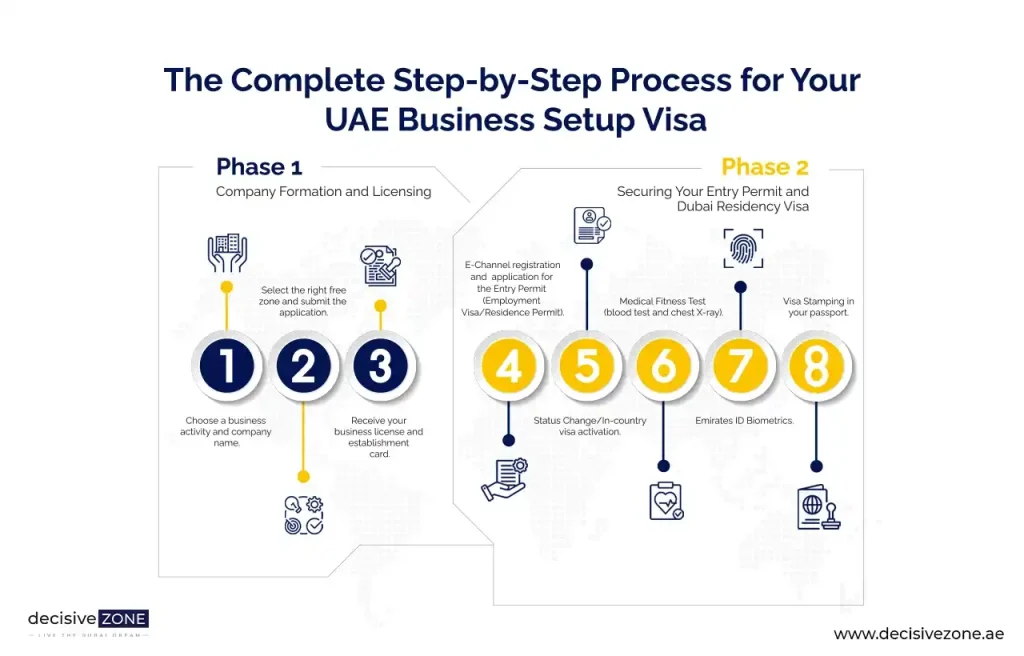
Phase 1: Company Formation and Licensing
Before you can apply for a visa, you need a legally registered company to sponsor you. This is the foundation of your business journey in Dubai.
Step 1: Choose a business activity and company name.
First, decide exactly what your business will do. Will it be a consulting firm, a trading company, or something else? Your choice determines the type of license you need. Next, you have to pick a name for your company. The name must be unique and follow certain rules, like not offending any beliefs and clearly stating its legal form (e.g., FZE or FZCO). The free zone authority must approve your chosen name before you can use it.
Step 2: Select the right free zone and submit the application.
Dubai has many free zones, and each one is good for different types of businesses. For example, some are better for tech companies, while others focus on trade. You need to pick the free zone that best fits your business activity. Once you’ve chosen one, you will fill out an application form and submit it along with your documents, like passport copies and a business plan.
Step 3: Receive your business license and establishment card.
After the free zone authority approves your application, you will get your business license. This official paper gives you the legal right to operate your company. Along with the license, you will receive an establishment card. This card is like your company’s own identification file with the immigration system and is necessary for applying for visas for yourself and your employees.
Phase 2: Securing Your Entry Permit and Dubai Residency Visa
With your company set up, you can now start the process to get your own Dubai residency visa.
Step 4: E-Channel registration and application for the Entry Permit.
Your company must register on the immigration’s online system, often called the “E-Channel”. This makes the visa process faster. Once registered, you will apply for an entry permit. This permit is a temporary visa, usually valid for 60 days, that allows you to be in the UAE while you complete the rest of the steps.
Step 5: Status Change/In-country visa activation.
If you are already in the UAE on a tourist visa when your entry permit is issued, you can apply for a “status change. This lets you switch to the residence visa track without having to leave and re-enter the country. If you are outside the UAE, you will use the entry permit to enter the country and activate your visa process.
Step 6: Medical Fitness Test.
All applicants for a residence visa who are 18 or older must pass a medical fitness test. You will go to a government-approved health center for this. The test includes a blood test and a chest X-ray to check for certain communicable diseases like TB and HIV. Getting a clean bill of health is a must to move forward.
Step 7: Emirates ID Biometrics.
At the same time, you will apply for your Emirates ID card. This card is your official identification in the UAE. You’ll visit a designated center to provide your fingerprints and have your photo taken. This information is linked to your residency visa.
Step 8: Visa Stamping in your passport.
This is the final step. After your medical test is clear and your Emirates ID application is in process, you submit your passport to the immigration authority. They will put a residence visa sticker inside it. This stamp officially confirms your right to live in the UAE for the duration of the visa.
Source: The information presented here is based on guidelines from official UAE government portals, business setup consultancies, and free zone authority websites like the UAE’s Official Government Portal and Aurion, as reflected in the cited sources.
Cost Breakdown and Investment Requirements for Your Dubai Business Visa
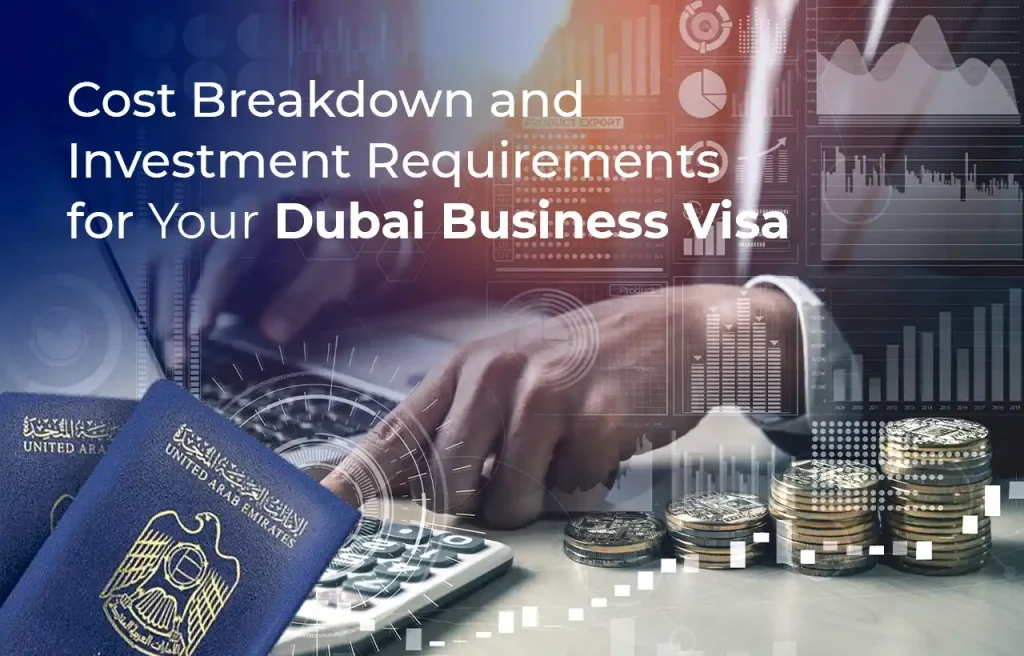
Understanding the costs involved in getting a Dubai business visa is important for planning your budget. The total amount can change based on the free zone you choose and the type of business you want to start. Let’s break down the main expenses you should expect.
Estimated Costs for a Free Zone Visa in Dubai
The total cost for a free zone visa in Dubai usually includes several fees. While prices vary between free zones, here is a general idea of what you might pay. The overall expense for setting up a company and getting one visa can range from AED 14,000 to over AED 26,000.
Here is a table showing the typical costs:
| Expense | Estimated Cost (AED) | Notes |
|---|---|---|
| Business License Fee | 10,000 – 50,000 | This is the main cost and depends on your business activity and free zone. |
| Establishment Card Fee | 1,000 – 2,000 | This card links your company to the immigration department. |
| Entry Permit Cost | 500 – 1,200 | A temporary permit to allow you to complete visa formalities in the UAE. |
| Medical Test & Emirates ID Fees | 700 – 1,700 | This covers the mandatory medical exam and the Emirates ID card application. |
| Visa Stamping Fee | 500 – 1,735 | The final step where the residence visa is placed in your passport. |
| Refundable Security Deposits | Varies | Some free zones may ask for a deposit, which you get back later. |
Investor Visa: Minimum Investment Requirements
When you hear about an “investment” for a standard two-year investor visa, it’s not usually a large cash deposit you need to make. Instead, the investment is the money you spend to set up your company. This includes paying for your business license, registration, and other setup fees. So, the cost of your business package itself is considered your investment.
The type of business package you choose can also affect how many visas your company is allowed to have. For example, a basic package with a shared desk (flexi-desk) might give you one or two visas. If you lease a physical office, you will likely get a higher visa allocation, allowing you to hire more employees.
For those interested in long-term residency, there are options with specific minimum investment amounts. For instance, the 10-year Golden Visa requires a minimum investment of AED 2 million in property or a business. A property investor can also get a two-year visa by investing at least AED 750,000 in real estate.
Hidden Costs and Budgeting Tips
While planning your budget, remember that there can be other small costs that add up. These are sometimes called hidden costs because they are not part of the main package fees.
Common extra expenses include fees for getting your personal documents, like marriage or birth certificates, officially attested. You might also need to pay for translation services if your documents are not in English or Arabic.
Also, be careful about deadlines. If you overstay your entry permit, you will have to pay fines. It’s always a good idea to budget a little extra for these unexpected costs.
Choosing Your Hub: A Comparison of Popular UAE Free Zones
Picking the right free zone is a big decision for your UAE free zone visa journey. Dubai has over 40 free zones, each with its own focus and benefits.
Some are perfect for tech startups, while others are built for global trading companies. The right choice depends on your business activity, budget, and long-term goals. A good fit can make your business setup smooth and successful.
To help you decide, let’s look at some of the most popular free zones. This will give you a clear idea of what each one offers and which might be the best home for your new company.
Comparative Analysis of Top Dubai Free Zones
Here is a simple table to compare some of the leading free zones. This comparison will help you see the differences in costs, what they are known for, and their special features.
Special Mention: IFZA’s Lifetime Free Investor Visa
Some free zones have unique offers to attract entrepreneurs, and one of the most talked-about is from the International Free Zone Authority (IFZA). IFZA has introduced a special offer for a lifetime investor visa for business owners.
This is a game-changer because it removes the need to pay for visa renewals every couple of years, which is a major recurring cost for any business owner. This provides you with long-term stability and peace of mind, allowing you to focus completely on growing your business.
To be eligible, you generally need to own an active company in IFZA, have a physical office space within the free zone, and follow all the rules and regulations set by the authority. This offer is designed to attract serious business owners who plan to stay and grow in Dubai for the long haul.
Meeting Free Zone Visa Requirements: Your Documentation Checklist
To get your Dubai free zone visa, you need to gather the right papers. Having all your documents ready makes the process much faster and avoids delays. Think of it as creating a checklist to make sure you have everything you need before you start.
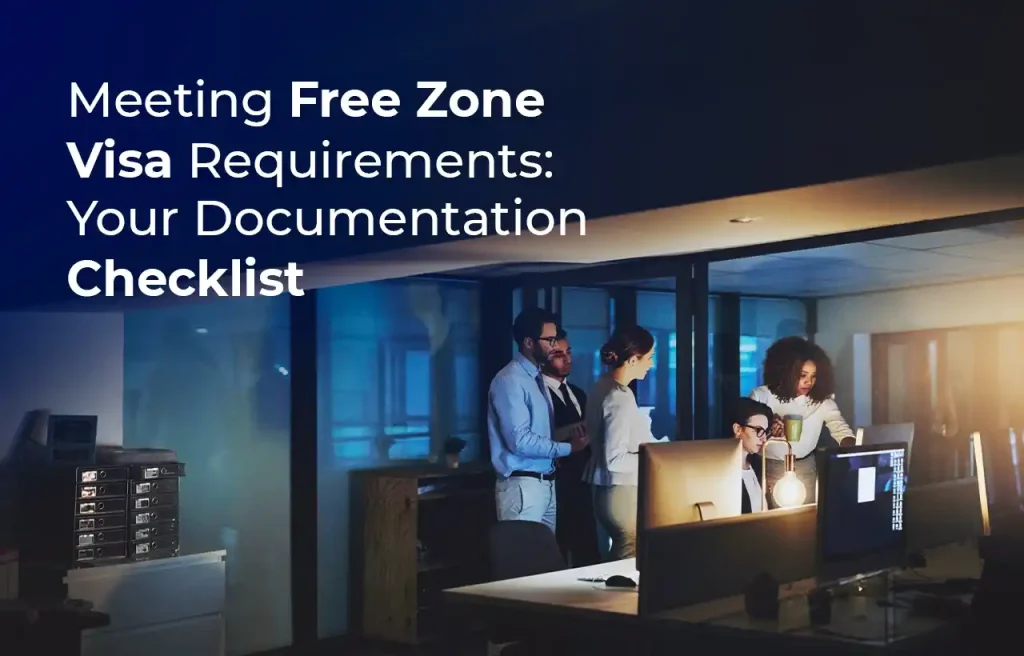
Core Documents for All Applicants
Everyone applying for a visa needs to provide a few basic documents. These are the first things officials will check.
Passport Copies: You will need clear, colored copies of your passport. Your passport must be valid for at least six more months from the date you apply.
Passport-size Photographs: You also need recent, high-quality photos. These should be passport-sized and have a plain white background.
Business License and Corporate Documents: If you are an investor, you must provide copies of your new company’s business license and registration papers from the free zone authority. For employees, a copy of the employment contract is needed.
Additional Documents for Dependent Visas
If you plan to bring your family with you, you will need a few more papers to get their dependent visas.
Attested Marriage Certificate: To sponsor your spouse, you must provide a marriage certificate that has been officially attested.
Attested Birth Certificates: For your children, you will need to submit their birth certificates, which also must be attested.
Sponsor’s Employment Contract/Salary Certificate: You’ll need to show proof of your income, like a salary certificate, to prove you can support your family.
Pro Tip: The Importance of Document Attestation
You’ve seen the word “attested” a few times. What does it mean? Document attestation is a process of getting your papers officially verified so they can be accepted in the UAE. For documents like your marriage or birth certificates that were issued in another country, they must go through a few steps.
First, they are certified in your home country. Then, the UAE Embassy in your country verifies them. Finally, the Ministry of Foreign Affairs (MOFA) in the UAE gives the final stamp of approval.
This process confirms that your documents are genuine and legally valid. It’s a very important step because, without it, your application for a family residence visa will be rejected.
Navigating Legal Compliance and Regulations (2025 Update)
Following the rules is a key part of having a successful business in Dubai. The regulations for your UAE residence visa are straightforward, and understanding them helps you stay compliant and avoid any problems.
Understanding Visa Validity and the Two-Year Standard
A few years ago, many free zone visas were valid for three years. However, this has changed. Now, the standard validity period for most new and renewed investor and employee visas in Dubai free zones is two years.
This means you will need to plan for visa renewals more often than before. The renewal process is similar to the initial application and includes getting a new medical fitness test. Keeping your business license active is also necessary for visa renewal.
Operating Legally: Free Zone vs. Mainland
When you have a free zone company, you are generally allowed to do business within your free zone and with companies outside the UAE. You cannot directly trade or offer services in the Dubai mainland market. This is a key rule to remember.
However, if you want to expand your business to the local market, there is a great solution called a dual license. This special license allows your free zone company to also operate legally on the mainland.
You get to keep all the benefits of your free zone setup, like 100% ownership, while also gaining access to customers across Dubai. Not all free zones offer this, but several major ones like DAFZA and DMCC do, in partnership with the Department of Economy and Tourism (DET).
Maintaining Your Visa and Residency
Once you have your Dubai residency visa, you need to maintain it. The most important rule to know is the “6-month rule.” To keep your residency visa active, you must enter the UAE at least once every 180 days.
If you stay outside the country for more than six consecutive months, your visa will be automatically cancelled. This rule applies to most residence visa holders, so it’s something to keep in mind if you plan to travel for long periods.
Renewal, Cancellation, and Long-Term Considerations
Once you have your free zone visa, it’s important to know how to manage it for the future. This includes renewing it on time, canceling it correctly if you leave, and thinking about long-term options if you plan to stay in Dubai.
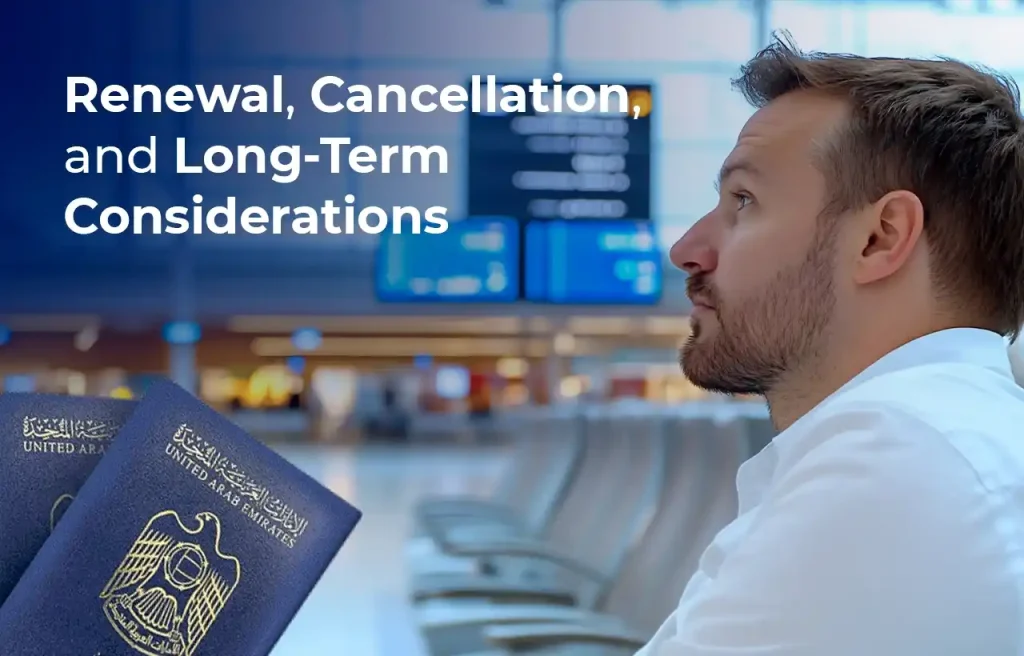
The Visa Renewal Process
Your UAE residence visa is typically valid for two years, and you must renew it before it expires to continue living and working in the UAE legally. The renewal process is quite similar to your first application. You’ll need to submit a renewal request through your sponsor, which is your free zone company.
A key step is that you must repeat the medical fitness test to show you are still in good health. You will also need to renew your Emirates ID card at the same time.
Once these are done and your application is approved, a new residence visa sticker will be placed in your passport. Remember, your company’s trade license must also be valid and renewed for your visa renewal to be processed.
Proper Visa Cancellation
If you decide to close your business or leave your job in a free zone, you cannot just leave the country. Your visa must be officially canceled. This is a very important step.
If you fail to formally cancel your residence visa, you could face fines and legal issues. It could also cause problems for you if you want to return to the UAE in the future.
The cancellation process involves clearing all your dues, getting a clearance letter from your free zone authority, and then submitting a cancellation request to the immigration department. It’s a formal process that officially closes your file and ensures you leave with a clean record.
Long-Term Residency: The Path Forward
If you see yourself in Dubai for many years, you might want to look beyond the standard two-year visa. The UAE offers longer-term residency options for certain people.
We briefly mentioned the Green Visa, which gives skilled professionals and freelancers a five-year, self-sponsored residency.
For those with bigger plans, there is also the Golden Visa. This is a 10-year visa for major investors, entrepreneurs, and individuals with exceptional talents. These long-term visas offer more stability and mean you don’t have to worry about renewing every two years.
Common Challenges and How to Solve Them
Even with a clear plan, you might face some bumps along the road when getting your Dubai work permit. Knowing what these common problems are and how to solve them can make your experience much smoother.

Problem: Application Rejection or Delays
Sometimes, a visa application gets rejected or takes longer than expected. This can happen for a few reasons. Simple mistakes on the application form or providing blurry copies of your passport are common errors.
Another reason could be a mismatch between your educational qualifications and the professional title you are applying for. In some cases, an application might be flagged for security reasons.
Solution: The best way to avoid this is to double-check all your documents before you submit them. Make sure every form is filled out correctly and all copies are clear.
If your application is rejected, find out the exact reason from the authorities. You can then fix the mistake and re-apply. Working with a business setup consultant can help you get it right the first time.
Problem: Opening a Corporate Bank Account
After getting your business license, you need to open a corporate bank account. This can sometimes be a difficult step. Banks in the UAE are very careful and have strict requirements to prevent illegal activities. They will want to know a lot about your business and may ask for many documents.
Solution: Be prepared. Before you go to the bank, have a solid business plan ready that clearly explains what your company does. You will also need to show them your passport, visa, and company documents.
Choosing the right bank is also helpful; some banks are more familiar with working with new free zone companies. Maintaining a healthy balance in the account once it’s open is also a good practice.
Expert Tips for Success for Dubai Visa for Entrepreneurs
Getting your Dubai visa for entrepreneurs is just the beginning. To make your move successful, you should plan ahead and use the right resources. Here are a few tips to help you get settled and start your business journey on the right foot.
Plan Your Post-Visa Life
Once your visa is stamped, you’ll need to sort out your personal life in Dubai. Having a simple checklist can make this process feel less overwhelming. Here are a few key things to do soon after you arrive:
- Open a personal bank account.
- Convert your home country’s driving license to a UAE license.
- Find a place to live, whether you are renting an apartment or a villa.
- Set up your utilities, which includes electricity and water (DEWA) and home internet services.
Use Professional Expertise for a Smooth Process
The company and visa application process involves many steps and paperwork. To avoid common mistakes and save time, it’s smart to work with a business setup consultancy. These experts know the ins and outs of the system and can guide you through each stage.
A great example is Decisive Zone, a leading company formation specialist in Dubai. They assist individuals and startups with the complexities of setting up a business in over 50 UAE free zones.
Their services cover everything from acquiring a license and company setup to PRO services, which helps with a smooth process for mainland, free zone, and offshore establishments.
Start with a Discovery Visit
Before you commit to moving your life and business, it’s a good idea to visit Dubai on a tourist visa. Spending a week or two in the city allows you to explore different free zones in person.
You can also get a feel for the lifestyle and different neighborhoods. This short “discovery” trip can help you make a confident decision about your big move.
Frequently Asked Questions (FAQs)
How long does it take to get a Dubai free zone visa?
The process typically takes between 1 to 4 weeks, depending on the specific free zone and the completeness of your application and documentation.
Can I sponsor my family on a free zone visa?
Yes, both investor and employee visa holders can sponsor their immediate family (spouse and children), provided they meet the minimum salary and accommodation requirements.
What is the main benefit of a UAE free zone visa?
The primary benefits include 100% foreign ownership of your business, 0% corporate and personal income tax, and the ability to repatriate all profits.
Do I need to live in Dubai with a free zone visa?
While you don’t have to live there permanently, you must enter the UAE at least once every 180 days to keep your residency visa active.
How much does the Dubai free zone visa cost?
Costs vary by free zone but generally range from AED 12,000 to AED 30,000, including the license, establishment card, and visa fees for one person.
Can I work on the UAE mainland with a free zone visa?
No, a free zone visa only permits you to work for the company within that specific free zone. A dual license is needed for mainland operations.
Is a medical test required for the visa?
Yes, all applicants for a residency visa aged 18 and above must pass a mandatory medical fitness test, which includes a blood test and chest X-ray.
Starting Your Dubai Journey
Getting your visa for a Dubai free zone is your ticket to some incredible advantages. You get to have full ownership of your business, enjoy amazing tax benefits, and experience a top-quality lifestyle in a vibrant city. This guide has shown you that with good planning and the right information, the visa process is very manageable.
You now have a clear picture of the steps, from picking the right free zone to getting the final visa stamp in your passport. With this knowledge, you are prepared to move forward with confidence. Your entrepreneurial journey in one of the world’s most dynamic cities awaits.

